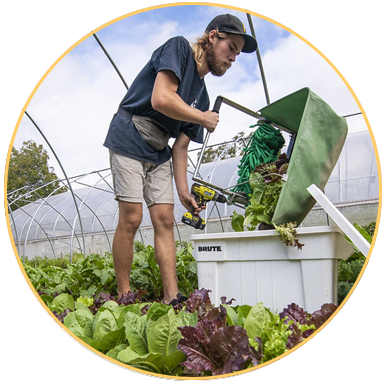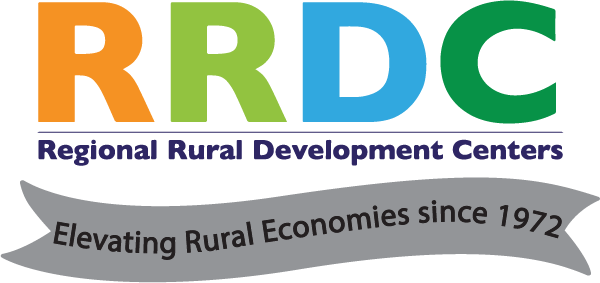About Regional Rural Development Centers
The Regional Rural Development Centers (RRDCs) are regionally focused centers funded by the United States Department of Agriculture (USDA) National Institute of Food and Agriculture (NIFA) to link research with Extension/outreach in the areas of rural economic development, forming a one-stop-shop connection to the nationwide network of Land-Grant college and university researchers, educators, and practitioners.
The RRDCs are a trusted source of economic and community development data, decision tools, education, and guidance for the nation’s rural communities. Established by the Rural Development Act of 1972, the RRDCs build capacity in the Land-Grant University System to address crucial needs in our nation's rural communities by:
- Convening research and/or Cooperative Extension teams around complex rural development issues
- Building collaborative networks and partnerships
- Serving as a regional hub for land-grant university partners across state lines
- Leveraging a strong connection to federal resources
- Generating data to better understand and address rural America's economic development problems
- Providing potential solutions that communities can adapt to improve their situations
- Translating university research to meet community needs
- Responding to local needs
- Facilitating community planning
- Educating clientele at the local level

Supporting a Rural Response to Climate Change
The RRDCs are uniquely positioned to connect and support multi-state groups such as the National Extension Climate Initiative and the Rural Population Research Network. Through this work, the RRDCs harness the capacity of the Land Grant’s Cooperative Extension Service to address issues of climate change and sustainability and to reach rural audiences who have a long history of partnering with Extension. Discover how the RRDCs are connecting and supporting a rural response to climate change.

Contributing to the Development of More and Better Markets
By leading and facilitating research and Extension collaborations in agritourism, outdoor recreation, rural innovation, local and regional food systems, rural workforce development, shocks to the supply chain, and broadband access and adoption, the RRDCs are expanding opportunities for rural entrepreneurs, and contributing to the resilience of existing businesses, not only for farmers and producers but also for the rural communities whose economic health is critical to a strong agricultural sector.

Understanding and Improving Food and Nutrition Security
RRDC-led research is exploring various dimensions of how the food system is changing over time and is affected by external disruptions such as a pandemic, how households are responding, and how local and regional food systems can enhance nutrition security. RRDCs also support regional multi-state groups working to ensure a safe, healthy, and affordable food supply that is accessible to all consumers. Explore the high-impact programming conducted in this area.

Centering and Promoting Equity, Access, and Opportunities
Working collaboratively with 1862, 1890, and 1994 Land-Grant Universities, the RRDCs have conducted train-the-trainer workshops to promote community dialogue around racial issues; advanced research, Extension, and outreach related to broadband use and business development in rural and tribal areas; and provide professional development and networking opportunities to promote digital inclusion and equity nationwide. Learn more about the RRDCs’ work to center equity, access, and opportunities.

Digging Deeper: Exploring What's Needed for Rural Recovery
Through an intensive stakeholder-engagement process conducted in 2021-2022, the RRDCs identified the investments seen as the most critical for U.S. rural communities to build capacity and improve quality of life. Learn more about these findings, which are informing the work of each of the RRDCs and have been shared with federal partners.
Any opinions, findings, conclusions, or recommendations expressed on this website or in RRDC publications are those of the authors and do not necessarily reflect the views of the U.S. Department of Agriculture or their host institutions. The RRDCs do not discriminate based on race, color, religion, national origin, sex, age, disability or veteran status.

